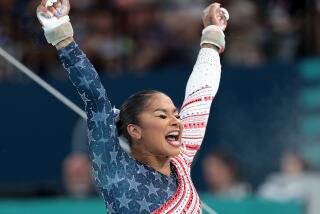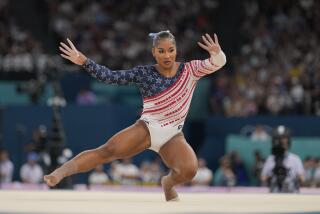U.S. Backs Athlete Appeal
- Share via
The U.S. Bobsled and Skeleton Federation said Sunday it will support Pavle Jovanovic’s appeal of a U.S. Anti-Doping Agency drug suspension that could disqualify him from the Salt Lake City Winter Games.
But it’s unclear whether Jovanovic, of Toms River, N.J., and the USBSF have time to make their case. Today is the deadline for prospective Olympians’ names to be submitted to the International Olympic Committee, and the Games begin Feb. 8.
Jovanovic, a pushman on Todd Hays’ top-ranked four-man bobsled crew, tested positive for a banned anabolic steroid during last month’s Olympic trials, the USADA announced Sunday morning. The USADA, an independent anti-doping agency that handles the testing and adjudication process for Olympic athletes, said Jovanovic’s urine had traces of metabolites of norandrostenedione at a concentration greater than 2 nanograms per milliliter of urine. In accordance with anti-doping codes of the Olympics and the international bobsled federation, it suspended him “at least through the 2002 Olympic Games.”
However, in a statement released Sunday afternoon, the USBSF said Jovanovic had unknowingly ingested the substance through a dietary supplement, and he should not be punished for a drug infraction if such substances aren’t listed on supplement labels.
As precedent, it cited the international federation’s treatment of Latvia’s Sandis Prusis, who tested positive for nandrolone Nov. 9 as part of an out-of-competition test conducted by the World Anti-Doping Agency and was banned from World Cup events and the Olympics. Prusis and the Latvian Bobsled Federation appealed to the international bobsled federation and blamed the results on dietary supplements.
The federation relented and allowed him to compete in the Olympics, although it wiped out his World Cup points and consigned him to an inferior start position.
In that case, the federation said: “There was compelling evidence that whilst the test was positive, it was through no fault of the athlete. There was clear evidence of negligence by third parties.”
Jovanovic, 25, slid with Hays, Randy Jones and Garrrett Hines. He also occasionally competed with Hays in the two-man event. The U.S. has not won a bobsled medal since 1956, but Hays has been touted as a potential medalist in the two- and four-man races.
According to the USBS, Dr. Donald Catlin, director of the International Olympic Committee-accredited drug-testing lab at UCLA, said while testifying for the USADA before the American Arbitration Assn. and Court of Arbitration for Sport that the metabolites found in Jovanovic’s system probably came from supplements and would not have given him a competitive advantage.
“Certainly the USBSF does not condone the use of prohibited substances and has vigorously prosecuted and sanctioned any athletes found to be using them, even when those sanctions have cost America international medals,” the USBSF statement said. “However, this is clearly not a case of an athlete intentionally cheating....
“This is not about the USBSF protecting Olympic medal hopes. This is about supporting a dedicated, honest athlete in his quest to compete in the ultimate competition and having the best athletes represent the U.S. at the Games. Dietary supplements, such as protein, are believed by many to be necessary to compete at the world-class level in bobsled. The USBSF does not believe that the athletes should bear the burden of an unregulated supplement industry that cannot guarantee all ingredients are identified on its labels.
“The USBSF is deeply disturbed that ... Sandis Prusis, who had approximately twice the level of metabolites in his urine, will be competing in the Games while apparently Pavle will not.”
The USADA has announced three suspensions this year. The first two were a two-year sanction against bobsledder Dave Owens and an 18-month sanction against boxer Joseph Pastorello. Owens acknowledged he had used testosterone as prescribed by his doctor for treatment of testicular cancer.
More to Read
Go beyond the scoreboard
Get the latest on L.A.'s teams in the daily Sports Report newsletter.
You may occasionally receive promotional content from the Los Angeles Times.







